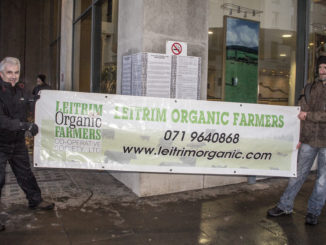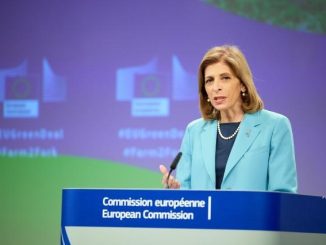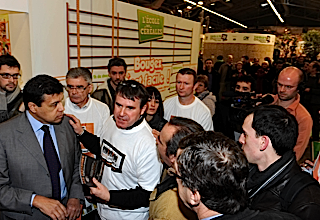Minor edits 13.20 06/04/2017
The momentum behind the European Citizens’ Initiative (ECI) to Ban Glyphosate (#BanGlyphosate) brought the campaign all the way to the corridors of the European Economic and Social Committee (EESC)NAT section in the EU quarter of Brussels Wednesday. NAT deals with Agriculture and Environment for the organisation, which describes itself as a “bridge between the Institutions and civil society”. There, four speakers gave their perspectives before a large crowd on the fourth floor, who had earlier been discussing CAP previously.
Opening proceedings Franziska Achterberg of Greenpeace’s Food Policy Unit outlined the stop glyphosate initiative, which has seen over 600,000 people sign the petition. A European Citizens’ Initiative is “an invitation to the European Commission to propose legislation on matters where the EU has competence to legislate”. The European Citizens’ Initiative needs one million EU citizens – coming from at least 7 of the 28 member states. Unlike TTIP, this ECI has been deemed legally admissible.
Our food policy director Franziska Achterberg presenting the #stopglyphosate #citizensinitiative at @EESC_NAT pic.twitter.com/qIC0rTeOi5
— Greenpeace EU (@GreenpeaceEU) April 5, 2017
Achterberg emphasised that there were three core aims of the campaign: to ban glyphosate, to reform the approvals process at EU level particularly regarding the use of “secret industry studies ” and for the mandatory reduction of pesticide use, with a view to a pesticide free future. She noted that “recent studies show that a reduction in pesticide use is not necessarily detrimental to productivity”, and that “Trace elements of glyphosate are now widely found in human biological samples”.
Michael Flueh of the pesticides and biocides unit at DG Health and Food Safety reminded the audience of the high standard of EU regulatory processes, and of the two steps products are approved by: Eu and Member State level. He claimed all documents are made available, that there is some co-formulant assessment and that there is the general discouragement of public authority use of pesticides. He noted also that a review of processes is already being conducted, which he implied was adequate to satisfy the ECI demand for a reform of the appeals process.
@leekandpotato We need to produce enough food sustainably. To say we can without #pesticides is a fallacy. #Glyphosate hearing @EESC_NAT
— ECPA (@cropprotection) April 5, 2017
Graeme Taylor, representing the European Crop Protection Association started with evidence of his being a family man, displaying a tweet of his two girls. After this unusual start, he expressed approval of the fact that the debate was actually happening – rather than the more typical “silos” of groups talking to themselves. He also lamented how the debate was “polarised”, and based on “fear”: “A polarised debate nurtured by fear rather than science is doing a disservice to everyone”. He described the IARC (which has described glyphosate as a “probable carcinogen”) as “an outlier” and reminded listeners of the 40% loss in crops to pests each year. Moreover, he claimed that 92% of carrots would be lost without glyphosate.
#Farmers4Glyphosate
We would like to stress that farmers use #glyphosate responsibly, helping them produce safe food & respect environment pic.twitter.com/qo3h4lEwlX— COPA-COGECA (@COPACOGECA) April 5, 2017
COPA’s Oana Neagu cited both how important glyphosate is for farmers -“we don’t have alternatives” while also pointing to the importance of integrated pest management and no till farming. She emphasised how safe, well trained and regulated pesticide handling is, and how glyphosate is beneficial for soil and climate change. She also invited people to farm open days to see farms for themselves.
Want to know more about EU #farming practices and challenges like #glyphosate ban? Why not take part in an farm open day?Here are the dates: pic.twitter.com/OHFbMkyShf
— COPA-COGECA (@COPACOGECA) April 5, 2017
ARC2020’s Oliver Moore noted that it was a careful, managed transition towards agroecology ARC2020 was advocating, over a seven to 10 year timeframe, beginning with IPM – integrated pest management. This would phase out pesticides as the functional biodiversity – beneficial below and above ground ecological work from bees to bacteria – of the agroecological processes would unfold.
He pointed out that the yield gap between organic and conventional is shortening, that there are numerous techniques – mechanical, biological and physical – which may act as alternatives to glyphosate, and that important peer reviewed studies get diluted by industry funded, unpublished papers.
Reference was also made to greater employment and farmer autonomy with agroecology, “maladministration” by the EFSA (as the Ombudsman described it) over its pesticide approvals processes, and the difference between real world and regulatory contexts: toxin handling on horticulture holdings, some with undocumented and exploited workers, inevitably leaves a lot to be desired. He appealed to farmers to join agroecologists in shaping a good food and farming movement.
.@oliver_moore making the case for organic farming principles as an alternative to pesticides #EESC #glyphosate @ARC2020eu pic.twitter.com/tgkwWNXWDm
— Justin Byrne (@justinbyrne42) April 5, 2017
A number of questions from the 150 strong audience were then offered to the panel for consideration, from a range of perspectives. Some supported the continued use of glyphosate, claiming that there had been 40 years of use without a problem; others pointed to how important it is for conventional farmers, how safe it is, and it was also claimed that much pesticide use was reducing.
‘In recent years we were able to reduce the amount of #pesticides – for full transition to #agroecology we need more tools’ @MMaciulevicius pic.twitter.com/kFDMZHaO1m
— EESC NAT section (@EESC_NAT) April 5, 2017
On the other side, contributors emphasised management over untrained use, and wondered whether the conventional sector was in fact so dependent on a single herbicide and if so, how vulnerable it was.
Responses included from Oliver Moore re-stating the inhibition of population in 15 major taxa via glyphosate, noting how there were in fact numerous approaches available to conventional growers apart from glyphosate, methods organic farmers who “don’t want pests eating their crops either” use, and finally reminding the audience that there were many pesticides banned over the previous four decades and yields had still increased. Grahme Taylor, countered, claiming glyphosate use was “good for biodiversity”.
Franziska Achterberg closed with some concluding remarks, while EESC NAT president Brendan Burns, from “North of Inverness” in the north of Scotland, closed proceeding at 13.00 hours.
As the momentum towards one million builds, no doubt these topics will get aired again. We in ARC2020 will keep you informed of this debate. See both sides of the argument in the videos below.
You are currently viewing a placeholder content from Default. To access the actual content, click the button below. Please note that doing so will share data with third-party providers.
You are currently viewing a placeholder content from Default. To access the actual content, click the button below. Please note that doing so will share data with third-party providers.







1 Trackback / Pingback
Comments are closed.